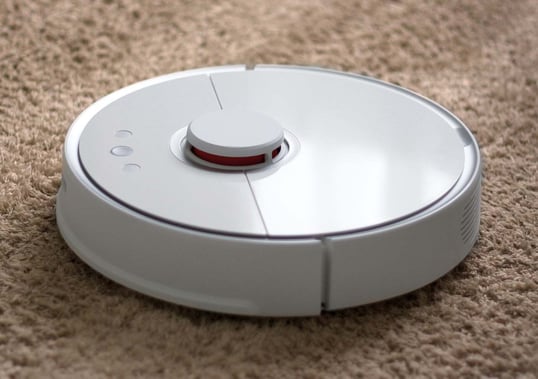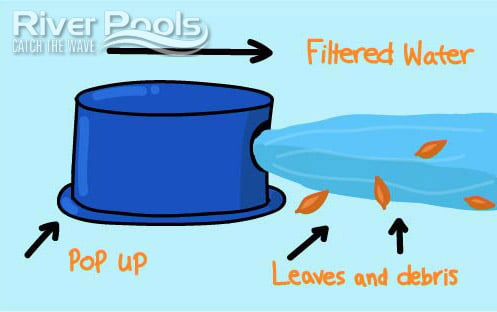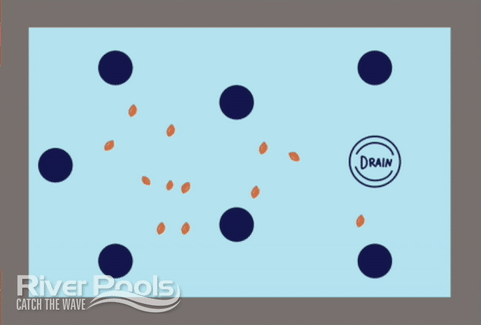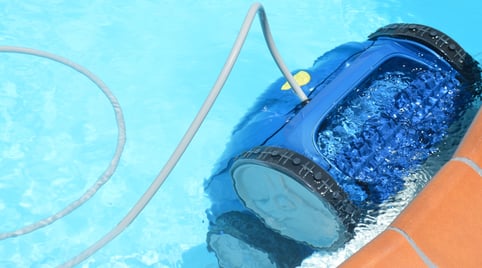What Is an In-Floor Pool Cleaning System? How It Works, Cost, Pros, and Cons
September 6th, 2019
6 min read

Everyone looks forward to swimming in their pool, but who looks forward to cleaning it?
Okay, some of you like cleaning the pool (maybe even you), but most people find pool cleaning to be a chore and would rather have someone or something else do it for them.
Many pool owners have already opted for a robotic pool cleaner, which is kind of like a Roomba for your pool walls and floor.

Robotic cleaners are great, but they do take some effort to use and aren't totally automatic.
Enter the in-floor pool cleaning system, AKA the self-cleaning pool. This technology has been around for decades, but it has improved a lot over the last few years.
Since we at River Pools have installed in-floor pool cleaning systems on our fiberglass pools on several occasions, we decided to share what an in-floor pool cleaning system is, how it works, how much it costs, and some pros and cons to help you decide if it’s a good fit for you.
What is an in-floor pool cleaning system?
An in-floor pool cleaning system uses pop up cleaners to clear the pool of debris and dirt. They’re called pop ups because they literally pop out of the pool floor to clean and then retract again when they're done.
These are typically installed when the pool is built and are placed all around the surface of the pool, including benches, steps, and walls.
The average pool might have 15 or more pop up heads scattered around in strategic zones. This may sound like a lot of hardware, but you don't need to worry - pop ups are flush with the pool’s surface when recessed and not in use, and they don’t get in the way of swimming or playing.
But how do pool pop ups work?
Let's take a closer look.
How does an in-floor pool cleaning system work?
Each pop up has a simple mechanism: it sprays pressurized, filtered water in a certain direction to move the dirt and debris towards the main drain of the pool. The drain then sucks in the dirt and debris where you can easily remove it later.

Rather than working alone, pool pop ups work in groups for faster and more effective cleaning. Group sizes typically vary from 2-10 pop ups, with each group in charge of cleaning a certain section of the pool.
The groups don’t all work at once though, as you might have imagined. They take turns in order to effectively move the debris to the drain section by section, sort of how you would use a broom to sweep all of the dirt in a room into one pile.

(This is not an exact representation of all of the system's parts, but it should give you a better idea of how the pop ups work together to move debris to the main drain.)
The pop ups may move the debris in a straight line from the shallow end to the deep end, or they could take another route, depending on your pool and the system that you use. The pop up heads also rotate so that they can spray water in different directions to get the debris off the floor and moving.
You should also be able to set the speed at which the pop up groups activate and clean the pool. The time that each section cleans may vary between 30-60 seconds, with shorter sessions being used for routine clean ups and longer sessions being used when the pool has more of a mess than usual.
Can in-floor pool cleaning systems be used on any inground pool type?
The simple answer is yes. In-floor pool cleaning systems can be used with fiberglass, concrete, and vinyl liner pools. The set up may be slightly different for each, so it's a good idea to consult with a variety of manufacturers and installers while planning your inground pool project.
How much do in-floor pool cleaning systems cost?
Self-cleaning pool systems start at around $5k and can cost more than $10k, depending on the size and shape of your swimming pool. This is an upfront cost that will likely be added to the final price of your pool project, so you’ll need to make room in your budget if you really want to add this feature.
Keep in mind that these systems cannot easily be integrated once the pool is fully installed, so it’s important to carefully consider whether this is a necessity for you while you’re still in the early stages of planning and buying your swimming pool.
In-floor pool cleaning system problems
While these systems are convenient, they can present a few problems to you as a pool owner.
To start, if one of the pop up heads breaks down, the whole system can stop working efficiently. Even worse, you may not notice right away when one is malfunctioning and in need of repair since the system operates automatically.
You could also experience issues with the main water valve or with the water pressure going to the pop ups.
In short, while self-cleaning pools can make your life easier, they can make your life harder if they break down because they can be tricky and expensive to repair.
Pro tip: Every once in a while, check that every pop up is extending and recessing all the way and notice if there are any spots in your pool that don't seem to be getting cleaned properly.
In-floor pool cleaning systems vs robotic cleaners
Now that you know a little bit about self-cleaning pools, you might be wondering why anyone would bother doing all of that when they can get a robotic pool cleaner.
That’s a valid thought, but there are some pretty big differences between robotic cleaners and in-floor pool cleaning systems. We summed up those differences in the following list:
- Robotic pool cleaners are not automatic - they have to be taken out, placed, moved, and cleaned out.
- In-floor pool cleaning systems, on the other hand, are totally automated and can clean your pool without much interaction on your part.
- Robotic pool cleaners are much more cost effective, costing anywhere from a couple hundred dollars to over a thousand dollars. In-floor cleaning systems can typically cost between $5k and $10k or more.
- In-floor cleaning systems help to circulate the water in the pool, which is good for keeping the pool clean and distributing heat. Robotic cleaners don’t do this.
- In-floor cleaning systems are typically silent whereas robotic cleaners can be loud and sometimes unpleasant sounding.
- In-floor cleaning systems may be more energy efficient, depending on how you run your robotic cleaner.

In-floor pool cleaning system pros and cons
To wrap up our review of in-floor pool cleaning systems, let's take a look at a quick list of pros and cons:
Pros
- Automatically removes debris and dirt from your pool
- Improves water circulation and heat distribution
- Can be installed in any pool type
- May use less electricity than other manual cleaning methods
- Variety of color options to match your pool’s surface
- Quieter than a robotic cleaner
- Prevents stains (letting dirt sit on the floor of your pool for too long can result in staining)
Cons
- Mainly keeps the bottom of your swimming pool clean (does not remove debris from the surface)
- Can be expensive to install
- Should be installed when the pool is constructed (difficult to install in existing pools)
- Can be problematic if it breaks down
- May not be enough (you may still need to break out the vacuum after a storm)
Our honest review of in-floor pool cleaning systems
In-floor pool cleaning systems get 10/10 for innovation and efficiency, but is it necessary to have one in your swimming pool? Not really. In the end, it comes down to convenience, preference, and cost.
If you can afford to have a self-cleaning pool system installed at the time of building your swimming pool and you like the convenience and all of the other benefits that come with it, it may be a great fit for you. Also, if you live in an area that carries a lot of dust, grass, or other debris into your yard, you'll see a greater benefit to having a self-cleaning pool.
However, if you really can’t afford it or if you just don’t see the need, there’s no reason to feel like you have to invest in one.
It’s also important to remember that, although they are called pool cleaning systems, they act more like pool sweepers. This means that they will clear out a lot of the dust and leaves that fall to the bottom of your pool, but you still have to test the water, add chemicals, and keep the water clear, sanitized, and safe for swimming. An in-floor pool cleaning system won’t do these things for you.
Want to learn more about inground pool accessories and options? Read our full guide here. As always, if you have any questions or comments, please leave them below.
At River Pools, we specialize in fiberglass swimming pools. Why not browse our catalog of models to see if one of our fiberglass pools is right for you? We have pools of all shapes and sizes and for small to large backyards.
Wondering how much your fiberglass pool will cost? Contact us today to request pricing and discuss the specific needs of your pool project. In the meantime, try out our fiberglass pool pricing calculator below for an instant cost estimate.

Want to see about how much that cost will be with all your favorite pool accessories?
Use our Design and Price Tool to walk through your options and approximate price!
If you’re still searching for the right inground pool for your home, be sure to download our free ebook which explains the key differences between the three main inground pool types.
Up Next:
Inground Swimming Pool Maintenance Costs: Chemicals, Electricity, and More
Marcus Sheridan is a co-founder of River Pools® Virginia and a leading voice in the fiberglass pool industry, known nationally for his commitment to educating homeowners about inground pools. Over the past two decades, Marcus has helped thousands of families confidently navigate the pool buying process with transparency and trust. His straightforward, educational approach has helped make River Pools a go-to resource for fiberglass pool buyers across the country. When he’s not writing or speaking about pools, Marcus helps businesses embrace honest communication to better serve their customers.


